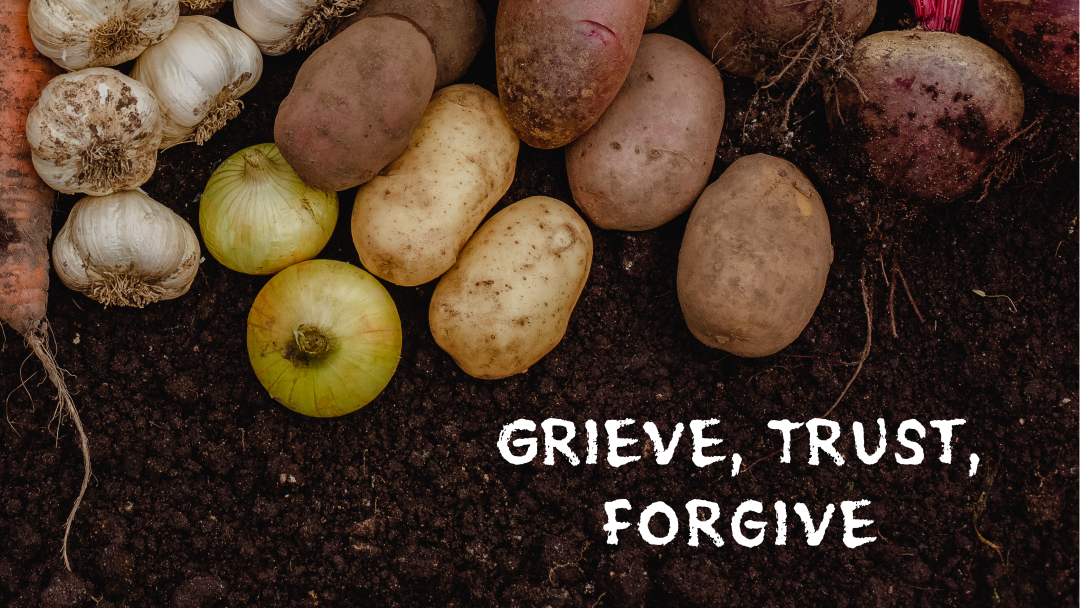
The Choice to Forgive
Life has a way of forcing us into situations where we must choose to either forgive or let our anger lead us to sin.
Maybe for you, it was the time when you walked into the room to find the people you thought were friends speaking negatively about you to one another, only to hear the sound of hushed whispers when one of them noticed you had walked in. Or maybe it was an authority figure who abused their power and treated you badly, causing you to endure an incredibly hard season of life. Or perhaps when you experienced a betrayal from a close friend or loved one. (Jesus can relate!)
Maybe it was a deep wound left by a family member after years of putting up with abuse or neglect. Or, very simply, someone you cared deeply for said something so hurtful that you just can’t seem to let it go.
In the broken world we live in, we are constantly put into situations that pressure our convictions about forgiveness.
But why should we forgive? In the movies, we all love a story where the hero was backstabbed by his supposed friend and ends up saying a cool quip when he inevitably gets his revenge. (See “Lion King” or “The Dark Knight” for more details!) Is forgiveness overrated in the end?
Well, perhaps we should find our wisdom for life from a better source than old movies. The Book of Exodus tells a story of a young man full of potential and integrity named Joseph.
The Tale of a Dysfunctional Family
Joseph grew up in an incredibly dysfunctional family. His family had one dad, four moms, and 12 sons. Meanwhile, the moms were at each other’s throats with jealousy. When the kids were young, they were uprooted from their extended family and moved to a distant land. Joseph grew up in this weird family dynamic where his Father favored him over all the other sons, and his brothers all resented him for it.
By the time Joseph was 17, the resentment had built up even more. They continuously mocked him for his God-given gift of interpreting dreams, calling him a “dreamer.” Eventually, their hatred for him grew to the point where they decided to murder their own brother. (Somebody call Dr. Phil!)
After stripping him of his fancy robe and throwing Joseph in an empty cistern with the plan of leaving him to die of dehydration, his brothers sat down for a nice celebratory meal. Luckily for Joseph, his brothers were more greedy than vindictive and ended up deciding to sell him into slavery for some extra money after one brother had second thoughts.
Joseph then spent years going from one bad situation to another. He spent years as a slave in Egypt, only to be falsely accused by his master’s wife and sent to prison. While in prison, he helped the Chief cup-bearer of the Pharaoh, only to be forgotten for 2 years and left in Prison.
Long story short, eventually, Joseph interprets a dream from the Pharaoh and is given power to be second in command over all of Egypt. During the famine that followed, Joseph’s brothers left the land of Canaan and went to Egypt in search of food. And unbeknownst to Joseph’s brothers, they end up standing before Joseph, the second most powerful man in the entire world at the time.
With a word, he could have had them killed. In a poetic act of revenge, he could have let them starve due to the famine. Better yet, he could have placed them all in empty cisterns or sold them into slavery. He could have had all the revenge in the world.
Yet, when Joseph was placed in the perfect opportunity to get back at those who harmed him, he chose to forgive his brothers.
Learning to Forgive
Sometimes, we look at these stories and think that these bible characters are not like us. They are “super-Christians” who don’t feel the emotions and pain that we feel. They couldn’t possibly understand the intensity of our hurt and pain. But the reality is that Joseph was just like us. He certainly felt the temptation to take revenge. There were likely many nights when he fell asleep in a foreign land, lonely and weeping.
Yet he chose to forgive. How is that possible?
Well, one key observation is that Joseph grieved his pain. Check this out in Genesis 45:1-2 (NIV). It says,
Then Joseph could no longer control himself before all his attendants, and he cried out, “Have everyone leave my presence!” So there was no one with Joseph when he made himself known to his brothers. And he wept so loudly that the Egyptians heard him, and Pharaoh’s household heard about it.
Even after meeting his brothers, it says in Genesis 45:14-15 (NIV):
Then he threw his arms around his brother Benjamin and wept, and Benjamin embraced him, weeping. And he kissed all his brothers and wept over them. Afterward, his brothers talked with him. (emphasis added)
Now, from an outside perspective, it seems like Joseph was an incredibly emotional person. Almost to the point of overdoing it. It wouldn’t be surprising if someone from the household of Pharaoh went up to Joseph and told him that he needed to “pull it together.”
However, as I researched forgiveness for this article, one thing every “expert” seems to mention is the need to acknowledge the hurt and pain caused by the other person.
In other words, before you can truly forgive someone for the hurt that they have caused you, you need to allow yourself to grieve the pain that was caused.
While we often think of grieving in the context of death, grieving is allowing yourself to feel pain and sorrow. Grieving is (courageously) facing the anger and sadness and allowing God to transform you through it.
Many of us believe that if we just push down the pain and refuse to grieve, it will go away. But if we look at the story of Joseph, we see that Joseph was a wreck of emotions. Only after allowing himself to feel the pain and sadness was he able to forgive.
God’s Role in Forgiveness
Joseph’s choice to forgive was such an incredible act of forgiveness that his brothers failed to believe he was genuine. They believed that the moment their father died, Joseph would turn his back on them. In Genesis 50:15-20 (NIV), it says,
When Joseph’s brothers saw that their father was dead, they said, “What if Joseph holds a grudge against us and pays us back for all the wrongs we did to him?” So they sent word to Joseph, saying, “Your father left these instructions before he died: ‘This is what you are to say to Joseph: I ask you to forgive your brothers the sins and the wrongs they committed in treating you so badly.’ Now, please forgive the sins of the servants of the God of your father.” When their message came to him, Joseph wept. His brothers then came and threw themselves down before him. “We are your slaves,” they said. But Joseph said to them, “Don’t be afraid. Am I in the place of God? You intended to harm me, but God intended it for good to accomplish what is now being done, the saving of many lives.” (emphasis added)
There are two key things in this passage that Joseph believed that helped him to forgive his brothers against all odds. The first thing Joseph believed is that punishing people for their sin is God’s job.
When someone hurts us, internally, we all have a desire to get back at them. The world preaches “don’t get mad, get even.” But when questioned if he would hold a grudge and pay them back for what they had done, Joseph asked the question, Am I in the place of God? Joseph believed it was God’s job to get the payback for sin. He trusted God to do his job and left him to deal rightly with his brothers.
The second key belief that enabled Joseph to forgive was that he believed that despite all that his brothers had done, God was using all of it for good. While his brothers may have planned evil, God used the pain and suffering to make Joseph stronger and fulfill the purpose He had for Joseph’s life.
While pride often leads us to focus on ourselves and the hardships we have faced, Joseph chooses to focus on God’s goodness. He recognized that part of God’s plan for his life was to endure hardship and suffering to make him a person filled with compassion for others.
As you work through forgiveness in your own life, remember to allow yourself to grieve. Trust that God will take care of punishing sin, and know that God will use every part of your journey for good.

